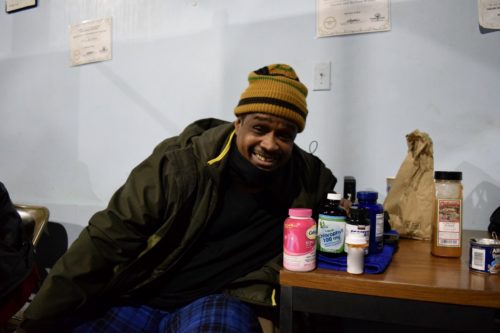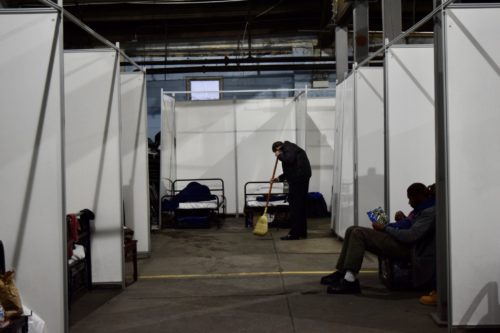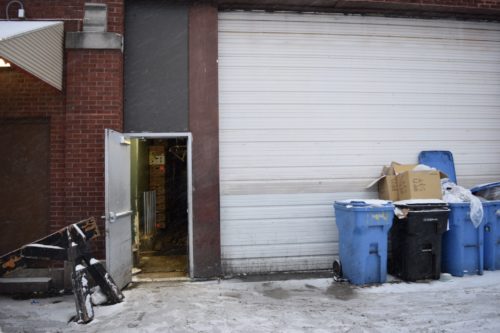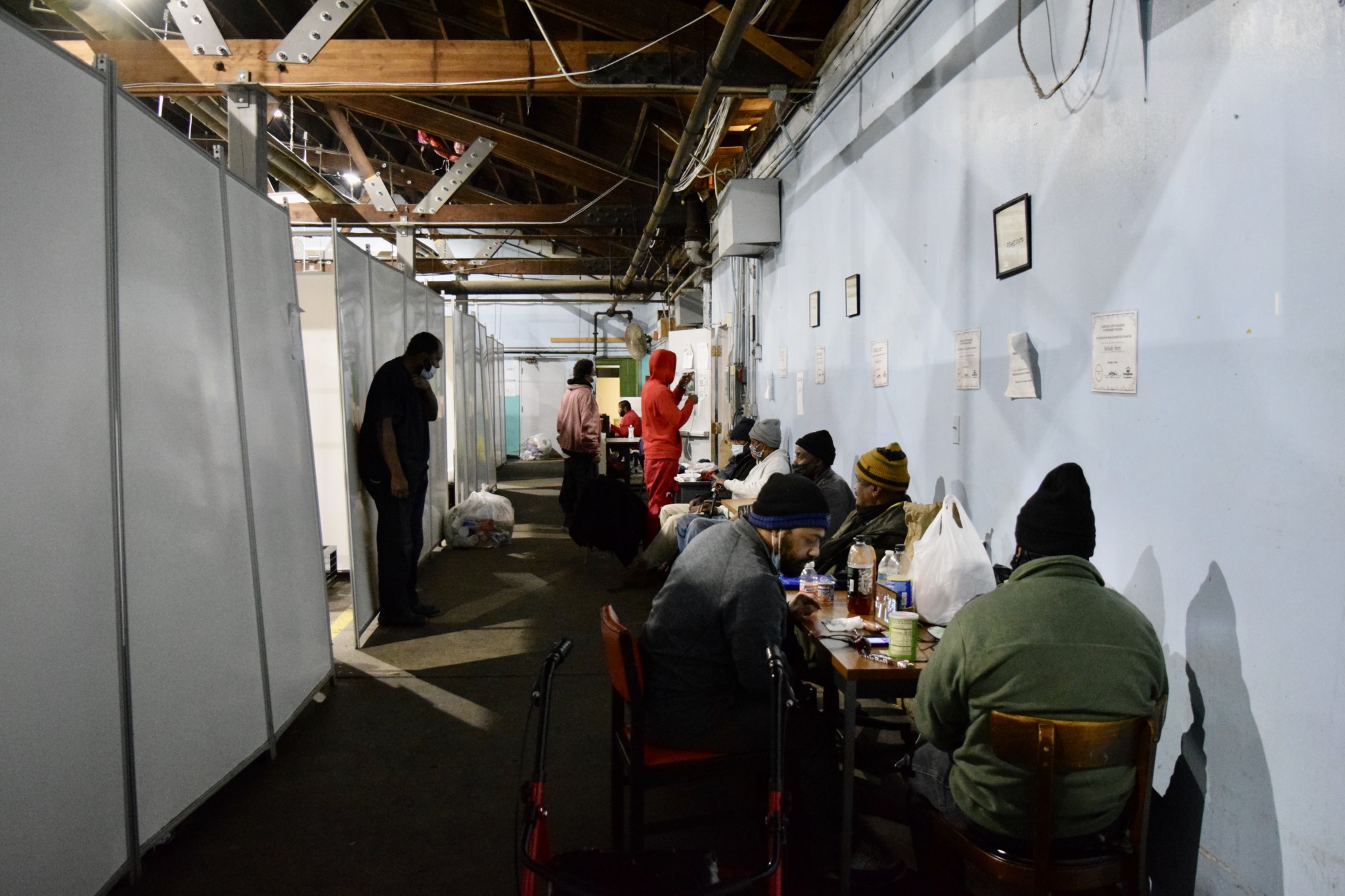As temperatures drop into the negatives and Chicagoans brace for even more snow, some people experiencing homelessness have been forced to choose between risking COVID-19 in a crowded—but warm—shelter or braving the cold to avoid an increased risk of contracting the virus.
When someone calls 311 to request shelter, a service operator conducts an assessment and uses the Chicago Department of Family and Support Services’ (DFSS) central database to match that person to an available bed. The database currently shows 3,000 beds at emergency shelters that DFSS funds across the city, as well as other partners that don’t receive funding. DFSS has been subcontracting the Salvation Army since January 1 to answer these calls.
DFSS generally relies on the fact that people are only staying at these shelters temporarily as a way to open up new beds, but reduced capacity and lack of turnover at many shelters due to COVID-19 has made it difficult for individual shelters to meet people’s need for a warm place to sleep at night.
A few days before temperatures dropped dangerously low on the first February weekend, homeless shelter provider Franciscan Outreach only had two beds open out of two hundred and seventy in all their three shelters. Right now, because of COVID-19, their guests have been there for up to nine months.
“I’m sure the city shares my concern as far as there not being enough beds at the moment, and what to do because we’re still trying to maintain capacity and social distancing. But at the same time if we know people are outside and in need of shelter, it’s hard to turn them away,” said executive director Richard Ducatenzeiler.
Tyrone caught COVID-19 in November during a fifty-five-person outbreak at the Franciscan Outreach shelter in North Lawndale in spite of doing all he could to stay healthy. “I’m very healthy, I take all kinds of vitamins,” he explained, reaching into his bag to pull out bottles of calcium, chlorophyll, super omega 3, and prostate supplements. “I even made the doctor give me some vitamin D pills. I told his ass, ‘Give me some.’”
“I was trying my best to avoid COVID,” he said. “That was almost next to impossible being inside of a building where you have 200 people because you’re constantly walking past, going to pass by. You have to have some type of interactions. There’s no such thing as social distancing to me when it comes to being homeless.”

That location’s capacity was reduced from 271 to 200 beds. The capacity of the Annex shelter in East Garfield Park was reduced from seventy to fifty beds, and their Pilsen shelter from forty to thirty. To make up for the lost beds, Franciscan Outreach temporarily operated a 200-bed shelter at the Rauner Family YMCA.
Though only one Franciscan Outreach shelter—the Pilsen location—was open 24/7 prior to COVID-19, the CARES Act has provided a little over a million dollars in funding for all three shelters to stay open 24/7 during COVID-19. This extra funding is set to run out at the end of March, at which point two of the shelters will have to return back to an overnight schedule.
In collaboration with Rush University Medical Center and Lawndale Christian Health Center, Franciscan Outreach started to respond to the looming threat of COVID-19 in February 2020. “We quickly gathered that it was going to potentially affect a lot of our guests since many of the people that come through our doors are very vulnerable,” said Ducatenzeiler. “A lot of them have disabling conditions, they have comorbidities, many of them suffer from diabetes, heart conditions, some cancer.”
But despite precautions like providing COVID-19 safety training for staff and installing handwashing locations across the three shelters, their guests were hit with a COVID-19 outbreak around Thanksgiving. “We’re not trying to screen people out of receiving shelter,” said Ducatenzeiler. “From the beginning of the pandemic, we knew that we were not looking to turn people away just because they’re exhibiting symptoms.”
Though guests aren’t tested for COVID-19 before being granted shelter, Tyrone told the Weekly that not everyone is eligible to receive shelter. “It was screening for being a sex offender, violent crimes, there was no screening for COVID-19,” said Tyrone. “The question was more in reference to whether you were violent or not, or what your past was like, rather than your health and well-being.”
The City of Chicago provided BinaxNow rapid tests to emergency shelters across the city, though staff were told that these are not effective on people who are asymptomatic. “No one should be referred to us if they have a fever of over 101,” Ducatenzeiler said. “But a lot of times it happens somehow, either they got a bad reading, maybe developed while they were en route. We’ll accept them, but we’ll test them, if they test positive, we’ll refer them to the medical respite center and they’ll come pick them up pretty quickly.”
Guests at homeless shelters who test positive for COVID-19 are typically sent to a medical respite center funded by the Chicago Department of Public Health and operated by A Safe Haven and Rush University Medical Center. The center provides twenty-four-hour in-person and telehealth care, including doctors, nurse practitioners, and behavioral health care services.
To qualify for bed space, individuals must be asymptomatic or mildly symptomatic, and must not have been convicted of a sex offense, violent offense, or arson.
After he tested positive, Tyrone spent four days in isolation at the medical respite center. “Oh, they had nurses, they had isolation beds, everything was well-planned, I mean it was like a hospital.” He spent the last six days of isolation back at the North Lawndale shelter. All guests were told to remain in their beds, in their area. “But we still gotta come out and use the bathroom. So, how is it isolation?” he asked.
Since the respite center opened on April 11, over 555 people have come through, all of whom have survived COVID-19. While the center originally had 100 beds, its capacity has since been reduced to fifty. The outbreak at Franciscan Outreach occurred right at the time when the medical respite center was forced to temporarily make drastic reductions to the number of beds available, leaving them without enough spots for Franciscan Outreach’s COVID-19-positive guests.
Franciscan Outreach had to create their own isolation space within their North Lawndale shelter. Though Lawndale Christian Health Center was able to check on guests once a day, it didn’t replace the twenty-four-hour care at the respite center. “Thankfully, nobody’s condition got to a point where we needed to contact the paramedics or anything like that or have them hospitalized, but it could have definitely happened,” said Ducatenzeiler.
Franciscan Outreach began offering the COVID-19 vaccine to their guests on January 27. Lawndale Christian Health Center also began providing education and discussions surrounding the vaccine around that time. So far, about half of Franciscan Outreach’s guests have chosen to receive the first dose of the vaccine.

“We’ve talked about possibly utilizing cots if we do need to take on an overflow,” Ducatenzeiler added. “Again, our concern is around social distancing and individuals who might be coming in off the street and maybe exhibiting symptoms and not really being able to properly isolate them if it’s on a temporary basis.”
Many other shelters were already near or at capacity before temperatures reached lows in the negatives this month. Lincoln Park Community Services (LPCS), another homeless shelter provider with two locations, only had one or two beds open between their two facilities when they spoke to the Weekly. “We’ll probably fill them today,” said Brianne Spresser, LCPS’ Homeless Services Program Manager.
LPCS is operating at reduced capacity because of COVID-19—at the onset of the pandemic, they lost thirty-one beds total between the two shelters. Right before the snowstorm last week, they were able to add sixteen beds by expanding into the common area of the church. Those filled up almost immediately.
By testing each guest upon arrival and requiring them to quarantine in a five-bed isolation space until they receive a negative result, LPCS has managed to avoid any outbreaks. Their shelters are also much smaller than Franciscan Outreach’s, with thirty-two beds in one location and nineteen in the other, following health protocols.
In addition to their medical respite center, A Safe Haven also operates a 400-bed shelter in North Lawndale. Though they did not lose any beds to COVID-19, their beds were full as of February 7. “We’re always at capacity,” said Neli Vazquez Rowland, the President of A Safe Haven. “The shelter in place has really created a challenge because we typically have turnover.”
Usually, people leave the shelter for jobs or apartments, opening up spots for new guests. But COVID-19 has slowed down this turnover process. “While we are doing our best to continue the process of placing people into apartments to make room for more people, it’s pretty slow compared to our ability to get people placed into jobs, for example, if you can’t get them out there interviewing,” said Rowland.
The Night Ministry’s emergency youth shelter, “The Crib,” which is located in Bucktown, did not have to reduce their number of beds as a result of COVID-19. But they are still struggling to meet the demand for shelter. “We’ve been approaching our capacity of twenty-one, if not at it, most nights,” said Betsy Carlson, the Director of Youth Programs.
At 8:30 every night, there’s a lottery for any open beds.
“Some nights, we do have to call the Salvation Army to ask that they pick up a few people to be able to find a different shelter bed for them,” Carlson said. But there have been nights when the Salvation Army hasn’t been able to locate any open beds in the system at all. In these cases, the Night Ministry has a few mats which they can lay out on the floor for overflow guests to sleep on.
But Carlson hesitated to say they could guarantee that everyone would have somewhere to sleep. “In theory, the city does say that they’ll find a bed for someone somewhere, but literally, we have a limited number of spaces that we’d be able to add a few extra people,” she said.
According to Quenjana Olayeni, the Director of Public Affairs at DFSS, the city made up for shelters’ reduced capacity due to COVID-19 by providing alternate shelters, including one at the unused Calumet High School.
“The city has been helping to fund some additional overflow beds,” said Carlson. “But particularly in these colder times, I do not think it has fully met the need.”
People calling 311 requesting shelter may also have to wait hours for a callback. “I will say that because the demand can be high one minute and low the next, the time they have to wait to be matched varies,” said Olayeni. “But there are some instances where some residents say they didn’t get a call back for an hour or two, so when that happens, I do personally encourage them to call again and follow up. Sometimes that wait can be longer than a resident could want.”

Though Tyrone was clearly concerned by the lack of COVID-19 safety inside the shelter, he also expressed that he didn’t have much of a choice. “As far as being safe on COVID, that would never happen inside of a shelter,” he said. “But where else can you go?”
Before he came to Franciscan Outreach, Tyrone had been experiencing homelessness in Chicago for three years. “Wherever my head laid, that’s where it was. Whether it be a cot, a cardboard box, a car, or anything,” he said. In the winters, he tried to stay at people’s houses.
But some nights, he had to sleep outside. “Whenever I couldn’t stay at nobody’s house or stay over [at] an abandoned building or church or nothing, I would go to the back of the alley and have to sleep with the raccoons. They knew who I was, they see me coming.”
Sergio, another guest at Franciscan Outreach’s North Lawndale shelter, had been experiencing homelessness for four or five years before he came to the shelter. He had struggled to survive through the winters.
“Well, we try to find empty houses,” he said. “Not only me, me and another people, we would come together to handle the situation in the winter with a lot of snow.”
“We know it’s bad, but we open the houses and try to survive inside with no heat, no power, no gas, nothing. Sometimes we [get kicked] out by the police in the street because, you know, we trespassing, but we survived.”
He doesn’t remember exactly how he came to the shelter—just that it was cold, in the middle of the night, during the winter, when he was picked up by Franciscan Outreach last year. “Thanks to God I’m with these people. I survived. I’m okay.”
Madeleine Parrish grew up in New Jersey and is currently a University of Chicago political science undergraduate. She last wrote about North Lawndale school closures.



